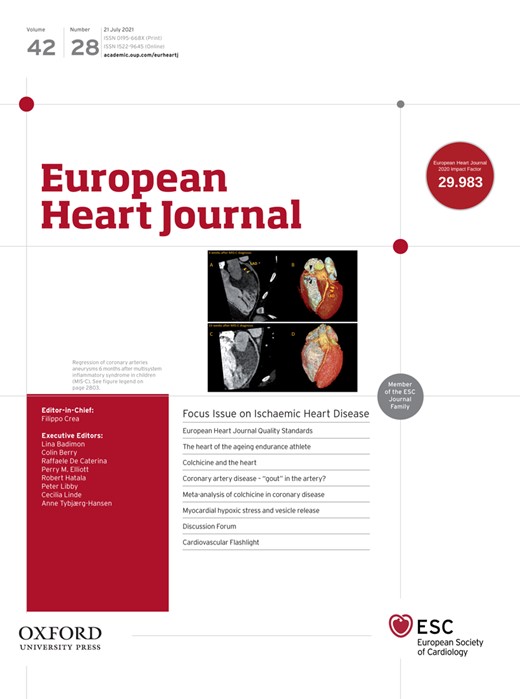-
PDF
- Split View
-
Views
-
Cite
Cite
Nadia Bouabdallaoui, Lucie Blondeau, Jean-Claude Tardif, Lessons from COLCOT and LoDoCo2: colchicine for secondary prevention in coronary artery disease, European Heart Journal, Volume 42, Issue 28, 21 July 2021, Pages 2800–2801, https://doi.org/10.1093/eurheartj/ehab020
Close - Share Icon Share
This commentary refers to the article ‘Time-to-treatment initiation of colchicine and cardiovascular outcomes after myocardial infarction in the Colchicine Cardiovascular Outcomes Trial (COLCOT)’, N. Bouabdallaoui et al., doi:10.1093/eurheartj/ehaa659; and the discussion piece ‘Colchicine and coronary artery disease: a virtuous adoption’, by F. Angelini et al., doi:10.1093/eurheartj/ehab008; ‘Initiation of low-dose colchicine early after myocardial infarction’, by N. Bouabdallaoui and J.-C. Tardif, doi:10.1093/eurheartj/ehab038; and ‘Colchicine administered early in acute MI: ready, set … go?’, by D. Vrachatis et al., doi:10.1093/eurheartj/ehab010.
We agree with Angelini et al. 1 that the adoption of colchicine offers physicians with a new weapon against coronary artery disease. The COLCOT and LoDoCo2 trials have included >10 000 patients and shown that colchicine reduces cardiovascular risk both in patients after myocardial infarction and in those with chronic stable coronary disease.2 , 3 Furthermore, a recently published meta-analysis has shown that colchicine reduces the risk of myocardial infarction by 38%, that of stroke by 62%, and that of urgent coronary revascularization by 44%.4
Angelini et al. pose the relevant questions of optimal timing of colchicine initiation, patient subsets likely to derive greater benefit, treatment duration, and monitoring. Initiation of colchicine within the first 3 days after myocardial infarction was associated with a reduction of 48% in the risk of the composite primary endpoint in COLCOT.5 This result was due to a lower incidence of myocardial infarction, stroke, and urgent hospitalization for angina leading to coronary revascularization. Notably, the benefit of colchicine when initiated beyond the first 3 days post-myocardial infarction was not significantly different than the overall result of COLCOT. This is in line with the large benefits of colchicine on the primary and secondary efficacy endpoints in patients with chronic coronary disease in LoDoCo2.3
In answer to one of the other questions of Angelini et al., there are no obvious clinical characteristics that make patients less likely to derive benefit from colchicine in COLCOT and LoDoCo2.2 , 3 Consequently, we believe that low-dose colchicine should be considered in all patients with unstable or chronic coronary artery disease in the absence of severe renal dysfunction to reduce the risk of cardiovascular events. In terms of treatment duration, increasing separation of cardiovascular event curves over time in favour of colchicine was observed with median follow-ups of 22.6 and 28.6 months in COLCOT and LoDoCo2, respectively.2 , 3 , 5 This observation, the clinical benefits of colchicine both in patients after myocardial infarction and in those with chronic coronary artery disease, and its cost-effectiveness as an economically dominant strategy,6 support long-term treatment.
There are two issues that should be taken into account when considering monitoring during chronic low-dose colchicine therapy. First, there is no formal requirement for serial blood measurements, to the exception of serum creatinine in patients with borderline severe renal dysfunction. Indeed, colchicine should not be given chronically to patients with an estimated glomerular filtration rate <30 mL/min/1.73 m2. Second, given that both COLCOT and LoDoCo2 reported large benefits of colchicine with wide inclusion criteria and no systematic measurement of inflammation-related biomarkers at baseline and during follow-up, monitoring of such markers does not currently appear warranted.
Low-dose colchicine is orally administered, inexpensive, and safe and lowers the risk of ischaemic cardiovascular events both in patients with a recent myocardial infarction and in those with stable chronic coronary artery disease. In patients with chronic coronary disease, inflammation reduction with colchicine could become the third pillar of secondary prevention, along with anti-platelet and statin therapy. In the post-myocardial infarction setting, initiation of colchicine before hospital discharge, within the first 3 days after the event, appears to provide even greater benefits and also represents a practical treatment strategy.
Conflict of interest: N.B. reports personal fees from AstraZeneca, outside the submitted work. J.-C.T. reports grants from Government of Quebec, grants from Canadian Institutes of Health Research, grants from Montreal Heart Institute Foundation, during the conduct of the study; grants from Amarin, grants and personal fees from Astra Zeneca, grants, personal fees and other from Dalcor, grants from Esperion, grants from Ionis, grants and personal fees from Sanofi, grants and personal fees from Servier, and grants from RegenXBio, outside the submitted work, and has a patent Genetic markers for predicting responsiveness to therapy with hdl-raising or hdl-mimicking agent pending, a patent Methods for using low-dose colchicine after myocardial infarction pending to Invention assigned to the Montreal Heart Institute, and a patent Methods of treating a coronavirus infection using Colchicine pending. L.B. has nothing to disclose.
References



